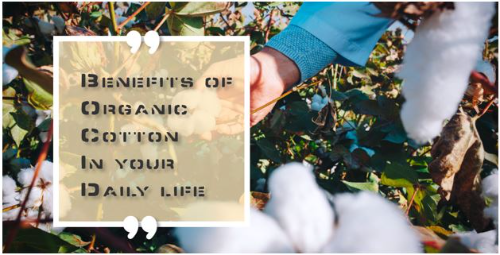Conventional cotton is one of the most predominant fibers used worldwide. Traditional cotton is produced using extremely polluting processes compared to organic cotton. The predominant alternative to traditional cotton is organic cotton, which is more environmentally friendly. This article will discuss and understand organic cotton’s benefits, characteristics, and uses.
- Organic Cotton Debunked

Organic cotton is grown without using any harmful pesticides or synthetic chemicals. Organic farmers use organic and natural methods to control any pests or weeds. This aspect makes organic cotton safe for the farmer, the environment, and the user who wears organic cotton clothing like Sepia Stories Irece Cotton T-shirt in Pale Blue.
2. Facets of Organic Cotton

Organic cotton has many facets; some of the major ones are listed below:
- Softer, Durable, and Breathable
- Safe for the skin
- Eco-friendly
3. Uses of Organic Cotton Fabric

It is used to manufacture a wide variety of products; some significant uses of organic cotton fabric are given below:
- Organic cotton clothing (Livbio, Windie)
- Organic cotton bedlinens & towels (Greendigo, Dvaar)
- Organic cotton clothing for kids (Tickle Tickle, Khela Kids)
4. Organic Cotton Uses Less Water
Organic Cotton uses less water during its growth period. 1 lint of conventional cotton requires a staggering 1,931 liters of irrigation water and an average of 6003 liters of rainwater. This 1 lint of cotton can produce only 1 T-shirt and 1 Jeans! In comparison, organic cotton uses only 1,100 liters of water for the lint required to produce 1 T-shirt like Windie Harvest 100% Organic Cotton Unisex T-shirt. With water scarcity already creating a drought-like situation globally, it is wise enough to consider switching to Organic Cotton.
5. Advantages of Using Organic Cotton
- Ideal For All Skin Types
Since organic cotton is devoid of harmful fertilizers or pesticides, it is ideal for all skin types, even on sensitive skin.
- Soft, Comfortable, and Breathable
Organic cotton fabric, when compared to conventional cotton fabric, is more softer. This makes it feel comfortable on the skin and allows it to breathe freely.
- Durable and Lasts Long

Organic cotton is not exposed to any chemicals; hence, the fabric is durable and lasts long when used to manufacture bedsheets, drapes, table mats, and organic clothing like organic cotton kurta for women (Tamaksh Women’s Indigo Cotton Handblock Printed Dabu Kurta) and organic sportswear (Free Authority).
- Bio-degradable and Compostable
Organic cotton leaves no toxic residues behind as it doesn’t contain any. Looking at the burgeoning clothing landfills of regular cotton fabrics, switching to organic cotton will lessen the waste and carbon footprint and protect the environment.
- Positive Impact
Organic cotton is also a means to support local organic farmers and rural communities economically and health-wise. By choosing organic cotton products, you help the farmers, yourself, and the environment at large.
If you’re looking for organic cotton products like organic cotton clothing, organic cotton bedsheets and blankets, organic cotton bathwear, organic cotton undergarments, and upcycled/recycled bags, Upcycleluxe has got you covered. Upcycleluxe is India’s 1st carbon-neutral sustainable online marketplace (www.upcycleluxe.com), and has a wide selection of products made using organic cotton fabrics from renowned and upcoming Indian sustainable brands.
Visit Upcycleluxe (www.upcycleluxe.com) to choose, purchase, and contribute to the circular economy and a healthy environment.

